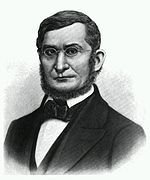Charles T. Jackson
| Charles Thomas Jackson | |
|---|---|

Charles Thomas Jackson
|
|
| Born | June 21, 1805 Plymouth, Massachusetts |
| Died | August 28, 1880 (aged 75) Somerville, Massachusetts |
| Nationality | American |
| Scientific career | |
| Fields | medicine |
Charles Thomas Jackson (June 21, 1805 – August 28, 1880) was an American physician and scientist who was active in medicine, chemistry, mineralogy, and geology.
Born at Plymouth, Massachusetts of a prominent New England family, he was a brother-in-law of Ralph Waldo Emerson and a graduate of the Harvard Medical School in 1829, where he won the Boylston prize for his dissertation. While at Harvard he made a geological exploration of Nova Scotia with his friend Francis Alger of Boston, which helped to increasingly turn his interests toward geology. In 1829 he traveled to Europe where he studied both medicine and geology for several years and made the acquaintance of prominent European scientists and physicians.
Upon returning to the United States he played an active role in the new state geological survey movement, serving successively between 1836 and 1844 as the state geologist of Maine, Rhode Island, and New Hampshire. In 1844-45 he was an on-site mining consultant to the Lake Superior Copper Company, one of the first companies to attempt mining the native copper deposits of Michigan's Keweenaw Peninsula on Lake Superior.
In 1847 Jackson was appointed United States Geologist for the Lake Superior land district, which was about to become one of the major copper-producing regions of the world. His leadership of that survey proved to be a disaster, and he was dismissed from his position and the completion of the survey was turned over to his assistants John Wells Foster and Josiah Dwight Whitney.
Jackson is particularly remembered for his involvement in a series of often bitter priority conflicts that left their marks on the scientific and social scenes of his day. They followed a standard pattern: a discovery would be announced by someone, Jackson would then claim prior discovery, and a controversy would ensue. Among them were conflicts over the discovery of guncotton (Christian Friedrich Schönbein), the telegraph (Samuel F. B. Morse), the digestive action of the stomach (William Beaumont), and the anesthetic effects of ether (William T. G. Morton).
...
Wikipedia
